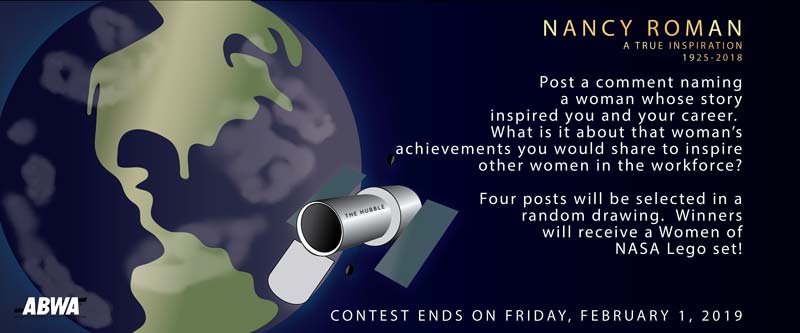
by American Business Women's Association | Jan 19, 2019 | Blog
CONTRIBUTING WRITER, LEIGH ELMORE. LEIGH SERVES AS THE EDITOR -AT-LARGE FOR ABWA’S WOMEN IN BUSINESS MAGAZINE AND ACHIEVE NEWSLETTERS.
Pioneering Astronomer Nancy G. Roman was “Mother of the Hubble Space Telescope. Nancy Roman knew from a very early age that she wanted to be an astronomer. Her greatest challenge was convincing the world that she could be a very good one. Overcoming traditional gender roles in the scientific community was almost as daunting a challenge as paving the way for the Hubble Space Telescope, an achievement for which she is most remembered. Roman, known as the “Mother of Hubble,” passed away on Christmas Day 2018 at the age of 93. She was NASA’s first chief of astronomy and one of the first women executives for the agency. Her achievements will live on
Her family moved around the country frequently when she was growing up. Roman cited both of her parents’ interest in the natural world—and her time beneath the clear night skies of Reno, Nevada—as an inspiration for her early interest in astronomy. Fueled by a fascination for the stars, she began her own astronomy club with a group of neighborhood girls when she was 11 years old. Though she knew she wanted to be an astronomer by the time she entered high school, her guidance counselor, who belittled her desire to take mathematics instead of Latin, discouraged her.
A promising student at Swarthmore College, Roman still had to ignore warnings from the Dean of Women and other teachers about studying science, ultimately earning her B.A. in Astronomy in 1946. She later recalled that the only encouragement she was given during her undergraduate years was by a teacher who told her, “I usually try to dissuade girls from majoring in physics but I think maybe you might make it,” National Geographic has reported
Roman went on to receive her Ph.D. in Astronomy at the University of Chicago in 1949, where she worked for six more years at the Yerkes Observatory as an instructor and assistant professor.
Seeing little chance for tenure as a woman, Roman took a position at the U.S. Naval Research Laboratory in Washington, D.C. where she eventually won the trust of her peers and began to work in radio astronomy, geodetics, and microwave spectroscopy.
She attended a lecture on the origin of the moon given at the newly formed National Aeronautics and Space Administration in the late 1950s where she was presented with the opportunity to work for NASA and set up a program in space astronomy.
As she told National Geographic, “The idea of coming in with an absolutely clean slate to set up a program I thought was likely to influence astronomy for 50 years was just a challenge that I couldn’t turn down. That’s all there is to it.”
She dedicated her time at NASA to promoting, initiating and supporting in-space observation, from satellites to the Scout probe. In 1964, her name was even given to a newly discovered asteroid, 2516 Roman.
But Roman’s crowning achievement at NASA was perhaps the greatest gift ever given to astrophysics: the Hubble Space Telescope, the groundbreaking satellite observatory that has generated more than 1.2 million observations and 14,000 scientific papers. Roman tirelessly laid the foundation that eventually made NASA’s space-based observatory a reality.
She retired from NASA in 1979 having prepared the way for Hubble’s eventual launch in 1990. “My work helped others explore the evolution of the galaxy,” she told National Geographic. “I did not let the fact that I was a woman deter me.”
Source: National Geographic, Dec. 31, 2018

by American Business Women's Association | Dec 11, 2018 | Blog, Uncategorized
The life of an entrepreneur – or at least the idea behind that life – can seem enticing to just about everyone. You launch a new enterprise that makes millions – and maybe even changes the way people lead their lives. But why do some people follow through on such visions with great fanfare and success, while others fail miserably – or never follow through at all?
“There’s just this mindset that the very best entrepreneurs have that positions them for success when others around them are struggling and unable to stay the course,” says Peter J. Strauss (www.peterjstrauss.com), an attorney, entrepreneur and author of the upcoming book The Accidental Life.
Strauss says that anyone who is feeling the entrepreneurial tug, and wants to mimic the most successful entrepreneurs, would do well to consider these three points:
- Remember that fortune favors the bold. On the outside entrepreneurs may appear confident and assured in their actions, ready to take the steps needed to achieve success without hesitation. In reality, Strauss says, most successful entrepreneurs have a voice inside them imploring them to wait, to not take that chance. The difference between them and others is they ignore that inner voice. “In my career, I tried to prepare myself as best I could for my next step, but I always had to take a leap of faith to some degree,” Strauss says. “There’s never going to be perfect time or situation that is a guaranteed win. For any significant opportunity, there is always a risk.”
- Take the “life gives you lemons” approach. Things don’t always work out the way we hope, but that doesn’t mean you have to accept defeat. Strauss points out that Steve Jobs was once fired by the board of the company he founded. “Steve Jobs easily could have decided that his life as an entrepreneur was not meant to be,” Strauss says. “Instead, he built another company and eventually found himself back at the helm of Apple. Jobs knew that whatever happened, his was not going to be a story of failure.” It’s inevitable that life will throw you curveballs, he says, so learn to hit them. “The good news is that adaptability can be learned,” Strauss says. “The more you train yourself to see possibility in the curveballs, the more you will adapt to hitting singles, doubles and even home runs.”
- Understand the “family” connection. Businesses often describe their organizations as “family.” Sometimes that’s just lip service, Strauss says, but in the best corporate cultures the team respects one another and holds each other accountable – much like a family. “If you are in a leadership position, it’s up to you to instill this mindset and to be the role model for it in your company,” he says. He even discovered that the business family he created as an entrepreneur helped make him a better parent. “If I don’t set clear goals and expectations at work, I can’t be disappointed or surprised when my team falls short,” he says. “The same holds true at home. Framing expectations as a dialogue will make your family and your team feel valued.”
“Ultimately, no matter the obstacles, entrepreneurs just find a way to persevere and get the job done,” Strauss says. “But that doesn’t mean it’s always easy. There are real risks involved. People rarely see all the ins and outs and ups and downs of what it takes to reach a place where you feel real success.”
About Peter J. Strauss
Peter J. Strauss (www.peterjstrauss.com) is an attorney, entrepreneur and author of several books, including the soon-to-be-released The Accidental Life. He is the founder and managing member of The Strauss Law Firm, LLC, on Hilton Head Island, S.C, and also the founder and CEO of Hamilton Captive Management, LLC. He is a graduate of the New England School of Law and of Harvard Business School’s Owner/President Management program.

by American Business Women's Association | Dec 5, 2018 | Blog
Generation Z comprises your newest group of customers and employees. But how much do you know about those who were born after 1995? To understand Generation Z, let’s compare them to the other four generations of people that preceded them who may be currently buying from or working for you.
Matures – born before 1946
These people could be your parents, grandparents or even your great-grandparents. They tend to be task oriented. Matures believe in rules of conduct and respect for authority. When they were young, they did not question; they simply did as they were told. Society was characterized by a militaristic, top-down structure. After all, many matures grew up during World War II or the Korean War. Members of this generation, for the most part, want conformity and rules.
There has always been inter-generational conflict. Members of the next generation (Baby Boomers) probably approached Matures with “You know, maybe there is a better way to do things.” Matures likely responded with, “No! This is the way has always been done. And it always will be done this way!”
Baby Boomers – born between 1946 and 1964
Most members of the next generation of employees desire meaningful work, and to have a bottom-line impact on the success of the organization. But they also want praise, recognition and appreciation for their extra hours and hard work, as well as the resulting financial rewards that accompany them. Boomers live to work.
In general, this generation is probably the most materialistic of the five. The attendees of my workshops theorize as to why the generations act the way that they do. One attendee speculated that Baby Boomers are so materialistic because many of their parents, who were Matures, struggled financially while they were growing up. Therefore, Matures instructed their Baby Boomer sons and daughters, “We don’t want you to deal with the hard times that we had to endure. Go make something of yourselves!” So Boomers did.
Generation Y – born between 1965 and 1980
Many of my attendees who are Gen Y feel like they are the forgotten generation. “Everybody seems to talk about Baby Boomers and Millennials,” they say. “Nobody seems to ever mention us.”
Like the Baby Boomers, most of Generation Y wants meaningful work. But with that desire comes an important caveat: they also desire a healthy work-life balance. They want relaxed dress codes, flexible leave policies and a freedom to do their job. Finally, they want a boss who is sensitive to their need for work flexibility and family values.
Millennials – born between 1981 and 1995
The next group is currently the largest generation in the workforce. Millennials (or Generation Y), for the most part, want to participate on a variety of substantial, important projects, which will allow them to learn and use new skills, especially their technical skills.
Millennials desire work that is personally rewarding. Because, unlike Baby Boomers who live to work, Millennials only work to live. They believe in Y.O.L.O. – you only live once – so you need to experience all that life has to offer, especially outside the job. This generation likely wants a boss who is more like a coach or mentor; they dislike bosses who are formal or hierarchical.
Some interesting facts about Millennials …
What percent of today’s adults are currently married with children compared to Baby Boomers of the same age? Baby Boomers – 50% whereas Millennials – 12%
What percent of Millennials expect to stay on the job for less than three years? 91% – which will translate into 15 to 20 jobs over their working lives
Where do Millennials want to live? 41% say in or near the cities
Generation Z – born between 1996 and the present
- It would be a mistake to think of this most recent generation as simply “mini-Millennials,” since they have characteristics that are uniquely their own.
- Gen Z is the most ethnically diverse generation. By 2020, nearly half of America’s youth will belong to a minority race or ethnic group. They tend to notice diversity only when it is lacking.
- Also by 2020, Generation Z will account for 40% of all consumers.
- Millennials are spenders, whereas Generation Z are much more cost-conscious. In fact, many of this generation prefers to shop in stores. They like to feel and see products in person. They want to make sure that they’re buying something high-quality.
- When Millennials were in middle and high school, brand names were all the rage (think Abercrombie & Fitch); Generation Z worries more about the economy and world ecology.
- When it comes being online, Millennials were born into the Internet; Generation Z has mastered the Internet. In fact, 40% of Generation Z said that working Wi-Fi is more important than operational bathrooms because teenagers spend an average of nine hours a day on social media. (Does your business have a social media presence to reach your next generation of customers?)
- Generation Z multitasks on five screens, not just one or two. As a result, Gen Z’ers have an attention span of about seven seconds. They experience F.O.M.O., which is a Fear Of Missing Out.
- Nine out of ten teenagers watch YouTube daily, and almost half “can’t live without it.” In fact, one of my attendees is a teacher. She told me that her students “don’t watch broadcast TV. No, they have influencers on YouTube that they follow. Every Thursday evening at 7:30, for instance, a particular social media celebrity will release a new episode. And they’ll be there to watch it.”
- Generation Z wants to know that brands financially support the same causes they do. They love to know that their purchases are making a real difference. And if Gen Z’ers can help produce or create the marketing message, they will be more responsive to it.
- When it comes to a career, 60% of Generation Z want their jobs to impact the world. Whereas Millennials are looking to get enough experience to beef up a resume and then move on, 75% of Generation Z would rather stay at the same company, but have different roles; perhaps serving stints in marketing, then accounting, then HR.
- Do you realize that 44% of recent college grads are employed in jobs that don’t require a college degree? 75% of Generation Z say there are other ways of getting a good education, rather than going to college, getting a degree and, with it, a boat-load of debt.
- According to Adecco, their number one aspiration after college is not to find the ideal job, as a Millennial might typically say, but instead to simply be financially stable.
- Millennials are collaborative; Generation Z is competitive. They saw their parents struggle through the recent recession enough to realize that in real life, (unlike what many Millennials might have been led to believe growing up) not everybody gets a trophy. As a result, 77% of Generation Z expects that they will need to work harder to achieve success than any previous generation.
About the Author
Ted Janusz, MBA, CSP is a Certified Speaking Professional who has delighted audiences for more than 5,000 hours, in 49 of the 50 United States, in Canada from Halifax to Vancouver, in Australia, Mexico, and Puerto Rico. Learn more at www.januspresentations.com.








